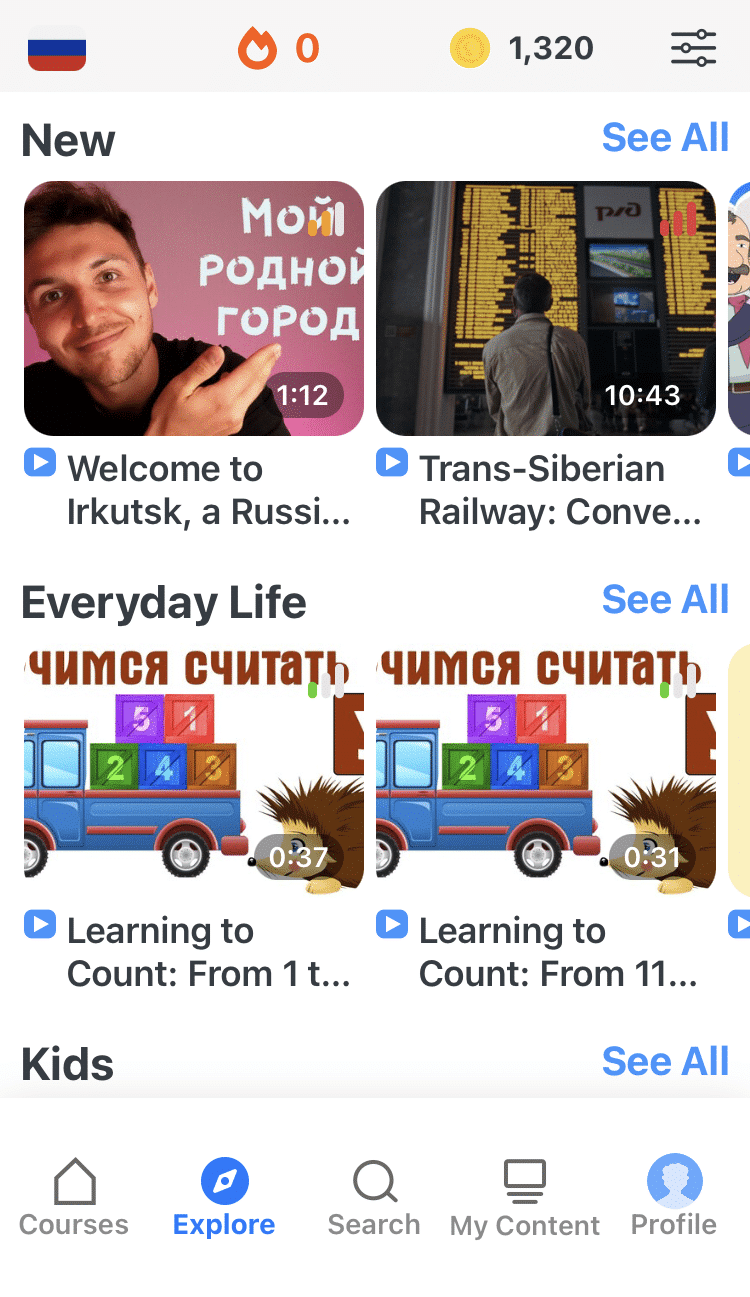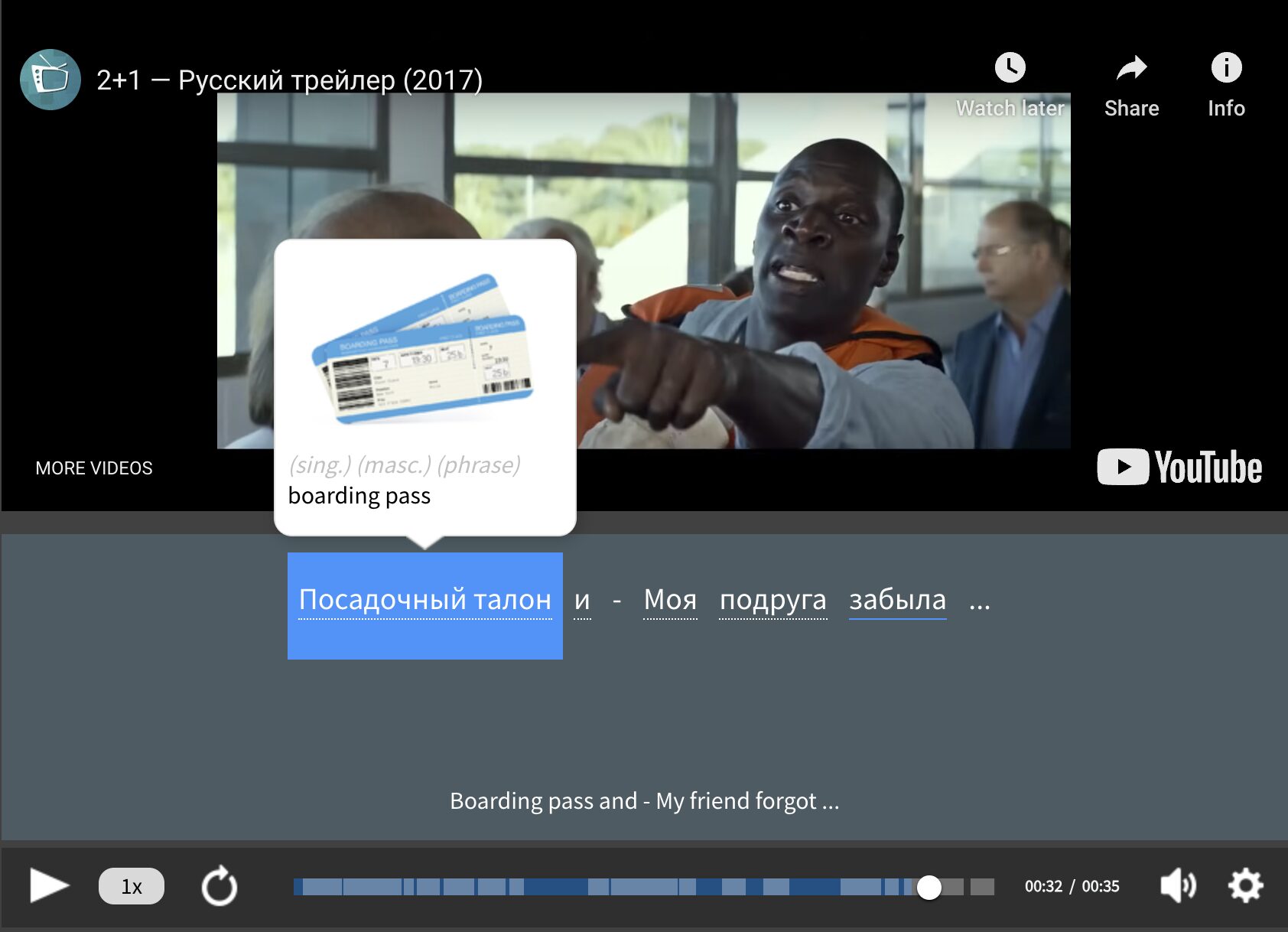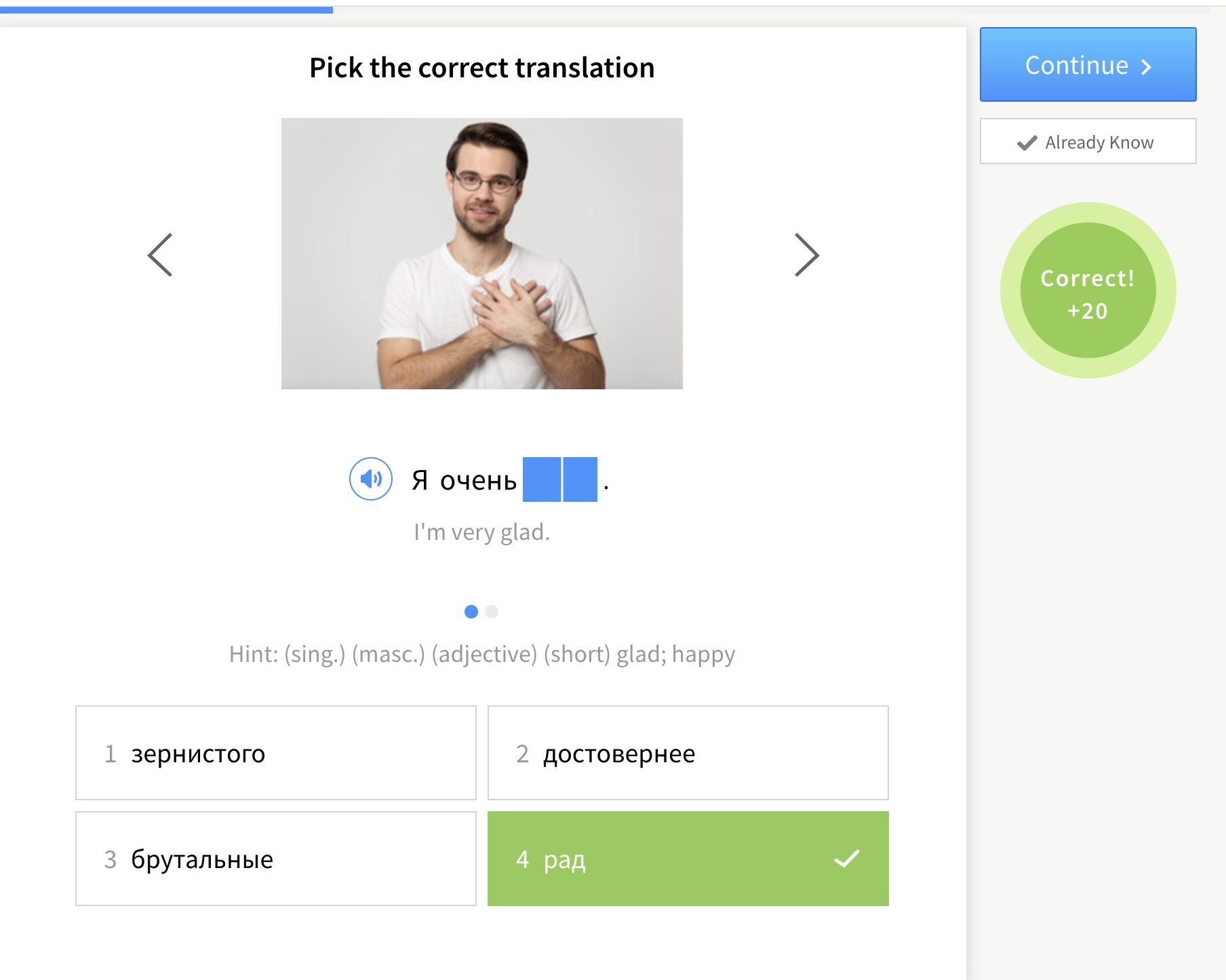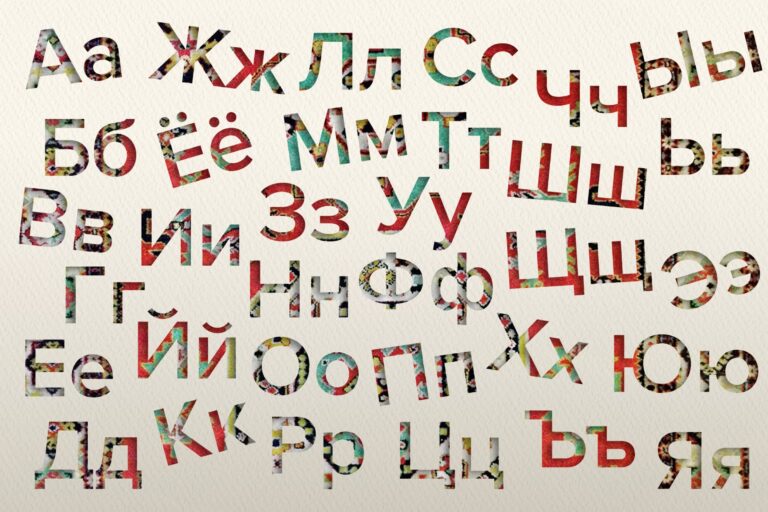Contents
- 1. Learn the Cyrillic Alphabet
- 2. Memorize the Most Common Russian Words First
- 3. Learn Cognates and Loanwords
- 4. Use an Online Russian Course or Program
- 5. Practice Your Skills Daily
- 6. Immerse Yourself in Russian, at Home or Abroad
- 7. Start Learning Important Russian Grammar
- 8. Find a Native Russian Speaker to Talk to
- 9. Study with High-quality Russian Books
- 10. Watch Russian Video Lessons
- 11. Download Russian Apps and Games
- FAQ About Learning Russian
- And One More Thing...
How to Learn Russian in 11 Steps

Want to learn Russian but don’t know where to start? Well, the confusion stops here.
In this post, I’ll tell you everything you need to know about learning Russian by yourself (even if you’re on a budget). Including how long it takes, which tips and tricks work best and how to make it fun.
Download: This blog post is available as a convenient and portable PDF that you can take anywhere. Click here to get a copy. (Download)
1. Learn the Cyrillic Alphabet
The Russian language uses the Cyrillic alphabet. Some letters are the same as the English alphabet, but others are different.
Many resources offer transliterations of Russian words, but you shouldn’t rely on these for more than a few days or weeks.
This is because several sounds in Russian are difficult to make using transliterations alone. For instance, ж should be pronounced like the “s” in “pleasure.” However, it’s usually transliterated as “zh.” Is it really easier to remember what “zh” is meant to sound like than to just learn ж?
Second, many Russian words are similar to English words. So learning the alphabet will help you instantly understand some written words just by sounding them out. Like the word аэропорт , which means “airport.”
You can easily learn Cyrillic in a few hours. This guide teaches you the entire writing system and its pronunciations:
The Russian Alphabet: A Simple Guide | FluentU Russian Blog
The Russian alphabet, or Cyrillic, is the first thing that you should learn before moving on to vocabulary or grammar practice. This guide will show you all 33 Russian…
You can also check out Master Russian’s guide or RussianPlus’s popular YouTube video:
2. Memorize the Most Common Russian Words First
Learning the most common words first will ensure that you’re able to use your Russian skills immediately.
Getting fully fluent will take more time, but being able to communicate in Russian right off the bat is like getting a running start. After all, if you know the most common words, you’ll be able to hold conversations and understand more Russian media.
To get started, try this guide to the 1,000 most common Russian words from 101 Languages.
You’ll also need to know basic words and phrases to express your ideas and maintain conversations. So here are a few to start with:
| Russian | Romanization | English |
|---|---|---|
| Привет! | Privet! | Hello! |
| До свидания! | Do svidaniya! | Goodbye! |
| Спасибо! | Spasibo! | Thank you! |
| Пожалуйста! | Pozhaluysta! | You're welcome! / Please |
| Да | Da | Yes |
| Нет | Net | No |
| Извините | Izvinite | Excuse me |
| Меня зовут... | Menya zovut... | My name is... |
| Как вас зовут? | Kak vas zovut? | What is your name? |
| Доброе утро утро | Dobroye utro | Good morning |
| Добрый день | Dobryy den' | Good day / Good afternoon |
| Добрый вечер | Dobryy vecher | Good evening |
| До встречи! | Do vstrechi! | See you later! |
| Как дела? | Kak dela? | How are you? (informal) |
| Хорошо, спасибо! | Khorosho, spasibo! | Good, thank you! (informal) |
| Не понимаю | Ne ponimayu | I don't understand |
| Пожалуйста, говорите медленнее. | Pozhaluysta, govorite medlenneye | Please speak slower. |
| Вы говорите по-английски? | Vy govorite po-angliyski? | Do you speak English? |
| Сколько это стоит?[/fluentu-tts] | Skol'ko eto stoit? | How much does this cost? |
| Можно счёт, пожалуйста? | Mozhno schet, pozhaluysta? | Can I have the bill, please? |
Here’s another resource for learning essential Russian vocabulary:
185 Basic Russian Vocabulary Words and Phrases | FluentU Russian Blog
Knowing basic Russian vocabulary is the first step in using the language, whether it’s as a traveler or a language learner. This post will provide 185 essential Russian…
3. Learn Cognates and Loanwords
Russian shares some words with English. They’re either exactly the same or look and sound very similar. Learning these words (cognates and loanwords) is an easy way to increase your vocabulary fast.
Here are 20 common Russian-English cognates you can learn right away:
| Russian | Romanization | English |
|---|---|---|
| Школа | Shkola | School |
| Университет | Universitet | University |
| Студент | Student | Student (in secondary education) |
| Музыка | Muzyka | Music |
| Компьютер | Kompyuter | Computer |
| Спорт | Sport | Sports |
| Кофе | Kofe | Coffee |
| Аэропорт | Aeroport | Airport |
| Бар | Bar | Bar |
| Видео | Video | Video |
| Джинсы | Dzhinsy | Jeans |
| Интернет | Internet | Internet |
| Класс | Klass | Class |
| Меню | Menyu | Menu |
| Номер | Nomer | Number |
| Паспорт | Pasport | Passport |
| Президент | Prezident | President |
| Телевизор | Televizor | Television |
| Телефон | Telefon | Telephone |
| Фильм | Fil'm | Film / Movie |
If you want to learn some Russian words that were borrowed from English, you can look at this list of words. For a more general list of words that are the same or similar between Russian and English, try this cognate article from The Russian Blog.
4. Use an Online Russian Course or Program
Russian courses are a powerful way to put your learning into overdrive. Here are a few I recommend.
Read Russian Videos
As I already mentioned, one of the first things you’ll have to do when you start learning Russian is master the Cyrillic alphabet. (You can visit this post for more tips on how to read in Russian).
This series of nine videos will teach you how to read any letter and word in Russian in under two hours. And it really works: With explanations in English and native pronunciations, this video mini-course will have you reading Russian in no time.
Drops
Drops is one of the fastest ways to build up your Russian vocabulary.
Perfect for microlearning sessions, Drops gives you five minutes to learn as many words as possible through easy exercises like pairing images to words, rearranging letters or determining if a word is written correctly.
Best of all, Drops will only use Russian to teach you Russian, so the immersion component is guaranteed.
Russian Accelerator
Russian Accelerator is an online course that focuses on teaching you Russian quickly through key phrases, contextual learning and pattern recognition.
This program boasts super literal translations (so you can see how each sentence is formed, rather than a simple definition), teaches grammar through patterns and context rather than memorization, uses guided immersion to get you practicing the language and much more. It’s a way to learn Russian naturally without traveling to Russia.
Russian Made Easy
This Udemy Russian course is designed to teach you the basics quickly. Video lessons are about 15-20 minutes long and feature native speakers.
Lessons cover vocabulary, the case system and verb conjugations. The 15 lessons in this course are free, while the 15 lessons in the next course are available for $20.
You can find a variety of other affordable courses on Udemy to target various aspects of Russian learning, from pronunciation to conversation to TORFL prep.
Live Lingua “Russian Fast Course”
Live Lingua’s “Russian Fast Course” is a free course that includes an e-book accompanied by audio. The idea is that you learn through “guided imitation” and repetition. The accompanying text also contains activities to improve your skills.
5. Practice Your Skills Daily
Daily practice keeps your progress moving forward, whether it’s through immersion techniques or just studying daily.
It can be tempting to study for hours one day and then wait a few days to study again. But it’s the least effective way to study a language.
To avoid this, there are two possible solutions: microlearning sessions and learning sprints.
How to Use Microlearning Sessions
Microlearning is becoming more and more popular among language learners because it allows them to be in contact with the language they’re learning in an easy and undemanding way.
A microsession lasts around five to 10 minutes, so it can easily be done while drinking your morning coffee or before going to bed.
If you use this method, I recommend a microlearning session in the morning and one in the evening every day (yes, weekends as well).
You can use any type of material you want for your microsession. For instance, you can do a couple of exercises on an app, watch a YouTube video, listen to a song while you read the lyrics, read a piece of news on the Internet or write a couple of things you’re thankful for in your journal.
How to Use Language Sprints
Many students use this method because they need to learn a huge amount of material in the shortest amount of time possible.
Efficient language sprints last around one to three hours. Some people make them even longer, but if you do this, make sure to take breaks. Your brain can only focus for a certain amount of time, and any work done after that might not be retained as well.
Sprints are normally done three to five times a week, and they can last more or less depending on the goal and the deadline the learner has chosen.
In a perfect scenario, you’d do four 2.5-hour sprints a week for a month. This totals 40 hours of learning during a period of four weeks, so get ready for an intensive month.
One key aspect of a language sprint is that you should practice one major language skill (listening, speaking, writing and reading) at a time.
For example, if you’re going to do four sprints a week, do one skill each day.
If you plan on doing less than that, divide your time accordingly. You can split a sprint into two smaller ones and use each of them to practice a different skill, but try not to do more than two skills on the same day.
This is because research has shown that multitasking—switching from one type of task to another—makes it more difficult to focus.
6. Immerse Yourself in Russian, at Home or Abroad
Immersion is the quickest way to learn any language.
If you can go abroad to immerse yourself in Russian, that’s great. If not, you can still immerse yourself at home.
Simple things like reading Russian magazines, labeling household items with their Russian names or watching Russian movies will go a long way toward improving your fluency.
To really benefit from home immersion, put together a plan. What will you do every day to surround yourself with Russian? Consider your daily routine, and think about all the places you could insert a little Russian.
Here are a few ideas:
- Download a Russian audio track to use as an alarm each morning
- Watch Russian cartoons with your breakfast
- Listen to Russian podcasts during your drive to work
- Use the Russian Vocabulary Stickers set for pre-made labels for common items around your home and office
- Create an in-home immersion environment
- Listen to Russian music
- Watch Russian movies
- Read Russian books
- Binge-watch Russian TV series
Keep a focus on using authentic Russian media. By using audio and video made for native speakers and listening to Russian in context, you can more directly apply what you learn to real-world situations.
The best content to learn with is media that comes with Russian subtitles. This will help you connect the words to the sounds you’re hearing.
With accurate subtitles, you’ll come across new Russian words, phrases and grammar points.
For this, I recommend an app like FluentU that streamlines studying Russian with native media. The subtitles let you read along with the content and click words to look up the translation, example sentences and native pronunciation.
FluentU takes authentic videos—like music videos, movie trailers, news and inspiring talks—and turns them into personalized language learning lessons.
You can try FluentU for free for 2 weeks. Check out the website or download the iOS app or Android app.
P.S. Click here to take advantage of our current sale! (Expires at the end of this month.)
7. Start Learning Important Russian Grammar
Once you’ve learned Cyrillic and a good base of vocabulary, it’s time to start easing yourself into Russian grammar.
Here are a few beginner topics that you should start to explore in this phase:
- Basic sentence structure. Russian sentence structure has similarities and differences with English. Russian sentences typically follow the Subject-Verb-Object (SVO) word order, but you have a bit more flexibility with sentence structure in Russian than in English.
- Noun gender. Nouns are gendered in Russian, meaning they’re either masculine, feminine or neuter. The gender of the noun will affect other words of the sentence, like adjectives.
- The case system. Like several other languages, Russian uses a case system. Cases are usually pretty challenging for English speakers to learn, but they’re vital to fluency and being understood. There are six cases in total.
- Adjective modification. Adjectives change forms in Russian because they have to match the noun in gender, number and case.
- Verb conjugation. Russian verbs are conjugated based on the person, tense and number.
- Pronouns. Personal pronouns are words for people, like “you,” “I,” “he,” etc. And possessive pronouns are words like “yours,” “my,” “his,” etc.
- Verb perfectiveness. Alongside cases, Russian has two verb aspects, perfective (complete, one-time action) and imperfective (regular, continuing or incomplete action). Due to that, there are practically two Russian verbs for every English one.
- Reflexive verbs. Many Russian verbs have one of two reflexive suffixes. They may mean that an action is reflexive (done to oneself), reciprocal (done to each other), intransitive, passive or its meaning is modified.
Here are some guides you can bookmark to master these beginner Russian grammar points:
https://www.fluentu.com/blog/russian/russian-word-order/
Russian Gender for Beginners | FluentU Russian Blog
Russian gender is actually pretty easy, believe it or not! There’s only three of them, and there are a few simple ways to tell them apart. Plus, there are only a couple of…
Russian Declension: Grammar Rules and Resources | FluentU Russian Blog
Russian declension giving you a headache? Clear up the confusion with our rundown of the rules and resources to master the necessary word endings. Once you understand…
Russian Cases: Examples and Simple Explanations | FluentU Russian Blog
Russian cases aren’t as difficult and complex as they first appear. Read this post to learn about what grammatical cases are and what the six Russian cases are, with…
Russian Pronouns and How They’re Used | FluentU Russian Blog
Learn about Russian pronouns with this informative guide! It’ll take you through every Russian personal pronoun, with explanations for each case so you’ll know exactly how…
8. Find a Native Russian Speaker to Talk to
Interacting with native speakers is a quick way to improve your skills. Speaking with Russians will improve your pronunciation, speaking and listening. A written pen-pal relationship can also improve your reading and writing.
If you don’t know any Russians, try an online language exchange program like Language.Exchange or MyLanguageExchange.com. These websites allow you to find native Russian speakers who are learning your native language. This way, you can help each other study your languages.
This blog post goes deeper into the topic of Russian language exchanges and gives more resources you can try:
https://www.fluentu.com/blog/russian/russian-language-exchange/
9. Study with High-quality Russian Books
Reading books is one of the fastest ways to improve your skills in any language. Reading makes you acquire new words faster, understand grammar better and improve your major language skills as a whole.
There are different ways you can use books to your advantage and several different types of books you can use.
- Russian coursebooks. This type of book is preferred when you’re learning on your own. It includes lots of information about grammar, lists of words, exercises, CDs to practice your listening comprehension and more. These books are very popular among self-learners because their pace is normally fast.
- Bilingual Russian books. I recommend you start using bilingual Russian books as soon as possible. They’re also known as “readers” and present entire stories or books in Russian, accompanied by translations into another language (like English). They allow you to see Russian used in an authentic setting, without watering down the vocabulary and grammar.
- Books. These are the novels, stories, biographies and memoirs as written by their authors, no translation or comprehension aids included. They’re the books you’ll read (if you enjoy reading) when you’re in the advanced stages of your Russian learning journey.
- Russian textbooks and workbooks. These are the books traditionally used in classroom settings. They include grammar, vocabulary, dialogues, cultural information and a ton of exercises.
- Books about learning Russian. These are books that give you extensive information about how to learn the Russian language. They include examples and sometimes exercises that help you apply what you’re learning. This type of book can be useful for total beginners since it introduces you to the language and includes explanations of the Cyrillic alphabet, the cases and the most important grammar rules.
- Grammar books. When you’re ready to master Russian grammar, I highly recommend investing in a solid grammar book. I wouldn’t recommend grammar books to people who are trying to learn fast. Granted, you need grammar to really master a language, but you don’t need that much grammar if you’re going for speed instead of perfection.
To top this section off, here are four books I recommend that will certainly help you boost your learning and reach your goals faster.
“The Everything Learning Russian Book”
I always joke that the title of this book is longer than the act of learning Russian itself. This is one of those Russian courses in book format that includes everything you need to build a solid Russian foundation quickly and smoothly. It includes a CD so you get to listen to native audio and practice all your major language skills.
“Learn Russian the Fast and Fun Way”
This book is chock-full of engaging material. Lessons are interspersed with activities that help you apply your knowledge. Since applying your learning reinforces it, this is a great way to improve quickly.
“First Russian Reader for Beginners”
If you’re starting to learn Russian and want to improve your language skills fast, this reader is the perfect option. It includes vocabulary lists and parallel texts to help you understand what you’re reading. I love that the author created each sentence by only using words and phrases that had previously been explained.
“Russian in 10 Minutes a Day”
With this engaging book, all you need is 10 minutes a day to learn Russian. Perfect for microlearning sessions, this book includes a workbook, interactive fun stickers to label your house, flashcards, activities and even software you can use on your computer to make the learning experience more enjoyable.
Here’s a more exhaustive list of Russian textbooks if you want to explore further:
18 Russian Textbooks for Self-studying Learners | FluentU Russian Blog
Studying Russian on your own? You need the best Russian textbooks to guide your learning! While some might consider them a form of old-school learning, there’s no doubt…
10. Watch Russian Video Lessons
Incorporating videos into your learning routine opens a window to Russian culture.
I mentioned earlier that native content is essential when learning Russian. It allows you to get immersed in the language and accelerates the whole learning process.
But native media isn’t the only type of media you can watch. There are millions of videos created specifically to teach you Russian (instructional videos), and these are also very necessary when you’re trying to learn the language. They give you summarized grammar information, tons of new vocabulary, pronunciation practice and more.
Obviously, not all video resources are good. So to save you some time, I’ve separated the wheat from the chaff and made a list of four video resources you should use to boost your Russian at superspeed.
Real Russian Club – “Slow Russian Lessons”
This series of videos in slow Russian was created by Daria Molchanova, a native Russian speaker who’ll tell you about her daily life, hobbies, holidays and many other topics.
She uses little English and a lot of Russian in her videos, which makes them perfect for pre-intermediate and intermediate students who want to get immersed in the language.
Easy Russian – “Learn Russian from the Streets!”
This Easy Russian playlist will allow you to see many places in Russia and listen to native speakers from around the country telling you what they like about their cities, what makes them happy, what inspires them, what their thoughts on Russian music are and more.
Even though the channel is called Easy Russian, the language level is more appropriate for intermediate and advanced learners. However, anyone can use these videos to get completely immersed in Russian as every video includes English subtitles.
FluentU Russian YouTube Channel
FluentU’s channel offers a collection of videos from different media sources (like the TV show “Friends”) that go over challenging and tricky Russian grammar points, vocabulary, real-life situations and much more to help anyone feel confident in their Russian skills.
Sistema Kalinka – “Russian Video course”
If you subscribe to this video course (it’s currently about $32/month), you’ll get over 150 30-minute videos divided into four levels, 250 native audio recordings, 300 pages of study material, grammar tables, exercises and a personal tutor who’ll answer all your questions by email.
Even though this is a comprehensive course to learn Russian, the video content is its main asset. You can see a snippet of a lesson and listen to some of the audio recordings on the course page.
11. Download Russian Apps and Games
There are many ways to make learning Russian fun. You can watch movies, series and cartoons, karaoke your lungs off, flirt online, read comics, learn Russian with memes and so much more.
However, two key tools amp up the fun while allowing you to keep learning: apps and games.
You can use them wherever you go, making them perfect for microsessions.
Not sure where to start? Here I’ve gathered four options that my students, friends and I love.
Fun Easy Learn
Fun Easy Learn is a free app that’ll teach you over 11,000 Russian words and phrases through over a dozen games. You’ll be able to practice your writing, listening, speaking and reading. And you’ll learn a lot of new vocabulary.
There are over 120 different topics, and each of them includes tons of words and exercises. Plus, you can use the app offline.
“The Witcher 3: Wild Hunt”
If you’re a serious gamer, you know The Witcher and Geralt of Rivia. This beautifully crafted game can be downloaded completely in Russian, and that includes the main menus, the in-game audio and the subtitles.
If you’re a beginner, switch on the Russian audio and leave the subtitles in your native language. If you’re an intermediate student, opt for both audio and subtitles in Russian. If you’re an advanced pro or want to feel real immersion with Geralt, change the game language to Russian completely.
LinGo Russian
Imagine being able to learn Russian through games—but you’re playing against other Russian language learners!
That’s LinGo, a game you can play in your browser and on your smartphone. The free version allows you to compete only in the Flashcard category, but if you go premium, you can also play with Words and Phrases. There are even Tournaments available in the premium version.
If you’re a complete beginner, I recommend you first study the lessons available. The games use words from the lessons randomly, so you never know what you’re going to get tested on.
Influent
Influent is my favorite game to learn languages. Influent is a 3D game/dictionary created to help you learn vocabulary and pronunciation. You go around a virtual apartment choosing objects, learning their names and a bit of grammar about them.
You’ll learn household and everyday vocabulary, but you’ll also have fun choosing what you want to learn, playing the minigames and helping Andrew Cross follow instructions.
My favorite part of the game is the “Time Attack” feature, which shows you the names of some objects and challenges you to find them around the apartment.
For more app ideas, I recommend checking out this post:
The 24 Best Apps for Learning Russian in 2025 | FluentU Russian
Need to find the best app to learn Russian? Click here to find a curated list of the best 24 apps for learning Russian, including Busuu, SemesterRus, Clozemaster and more.…
And here’s one for online Russian games:
Russian Learning Games: 6 Online Resources | FluentU Russian Blog
Russian learning games are a great way to have fun and improve your language skills at the same time. These 6 websites offer 100+ great Russian games. Play to achieve…
FAQ About Learning Russian
Is Russian hard to learn?
The Foreign Service Institute (FSI) lists Russian as a Category III language, meaning it’s moderately difficult to learn.
Russian can be challenging for English speakers because you have to learn a new alphabet, grammar rules and their exceptions, the pronunciation, the case system and other grammatical differences from your native language.
Russian is challenging, but it doesn’t have to be stressful as long as you have the right perspective and strategy, which you can do with the tips described earlier.
Is it possible to learn Russian by yourself?
Yes, it’s 100% possible to learn Russian by yourself.
Finding free or affordable resources is easy, many of which can take you to the advanced level. Once you find the right tools, consistency and hard work are all you need to become a fluent Russian speaker.
Should you try to learn Russian fast?
One popular reason to attempt to learn Russian fast is if you need to use Russian soon. Whether you have an upcoming trip to Russia or a business meeting with Russian speakers, you may need the language in the not-too-distant future. This will certainly drive you to learn Russian quickly.
You might also want to learn Russian quickly to stay motivated. Quick results are very motivating. If you notice a marked improvement in your skills, you’re much more likely to keep studying Russian, which will, in turn, lead to more learning.
Another reason to learn Russian quickly is to maintain focus. Staying interested in a subject for a long time can be difficult. If you learn Russian quickly though, you should be able to maintain focus long enough to gain some real skills.
How long does it take to learn Russian?
There’s no exact answer to how long it takes to learn Russian, but we can get an idea.
You won’t become fluent in a couple of months, but you can achieve an impressive level by then.
The FSI states that it should take you around 1,100 hours of study to become fluent in Russian. How these hours are distributed is up to you, but as a language professor and a polyglot myself, I wouldn’t recommend studying more than two or three hours a day (and even this amount seems too much for my liking).
So, for instance, if you study one hour a day, it’ll take you three years to master the Russian language. If you take it up a notch, let’s say to two hours a day, then one and half years is all you need.
Now that you know the best ways to study Russian, you’ll be speaking Russian faster than a native would pronounce рентгеноэлектрокардиографический (electrocardiographic X-ray).
And One More Thing...
If you're like me and love learning Russian through real-world content, FluentU is a game-changer. With FluentU, you're not just memorizing Russian words—you’re learning how native speakers actually use them.
With our newest feature, you can now bring FluentU’s interactive tools to any subtitled content on YouTube or Netflix—or even import YouTube videos directly into your FluentU account!
You’ll also get access to a huge variety of Russian content in our curated video library, from movie trailers to news clips, music videos, and more. The best part? FluentU makes this native-language content accessible for learners of all levels.
While you watch, you can tap on any word in the interactive subtitles to see a definition, an image, audio, and useful example sentences. Want to practice new words later? Add them to your flashcards with one click. No more pausing to look up new words!
And FluentU helps you actually remember what you learn with personalized quizzes, plenty of example sentences, and extra practice with the words you find difficult.
Ready to start learning Russian in a more natural, immersive way? Try FluentU on your computer or tablet, or download the FluentU app from the App Store or Google Play. Click here to take advantage of our current sale! (Expires at the end of this month.)












